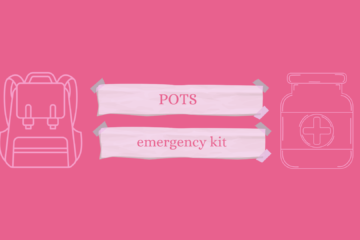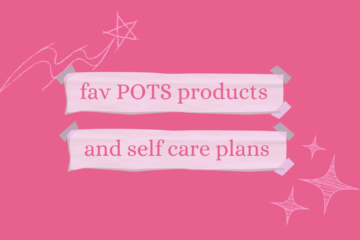Knowing how to talk to your family and friends about POTS can be a little scary at first. When I first got diagnosed, I never knew what to say when someone asked me what it was or what they should do because I didn’t really know the answers myself. With the holidays coming up, you might be around some people who will ask questions about your diagnosis so I put together some sample explanations of common situations that you can tweak to fit what you are comfortable sharing.
Remember that you don’t have to share everything right away or ever. You can chose whatever you are most comfortable sharing or you can kindly direct them to doing the research into POTS for themselves. While sharing your diagnosis can help others understand your needs and support you better, you aren’t required to be a POTS educator to other if you don’t want to.
If you just want to give then a brief explanation about what POTS is and how it affects you:
“I have something called postural orthostatic tachycardia syndrome, also called POTS, which is a type of dysautonomia. What this basically means is that my autonomic nervous system, that controls heart rate, blood pressure, digestion, etc., doesn’t work quite right. When I sit or stand up, my heart rate goes up really fast, making me feel lightheaded, dizzy, or even lose consciousness. Symptoms can change and vary from day to day and I often have flare ups from simple things like standing or taking a hot shower. It’s not contagious and there is no “cure”. It is still being researched, but my doctors are doing their best to help me function. That said, there maybe be times where I can’t participate in things because of how I’m feeling, but I want you to know that my lack of participation has nothing to do with my feelings towards you and all with how my body is functioning that day.”
If they ask what the treatments for POTS look like:
“There is no absolute cure but there are a few different medications that can help manage my symptoms. There are also a few products that help like salt supplements, compression socks, and wedge pillows that make it easier on me during day to day life. Most doctors recommend going to some type of therapy, as the emotional toll can be pretty rough sometimes. Other than that, its just finding what lifestyle changes and products work best for me and what symptoms I am feeling most that day.”
If they are wondering what the symptoms are:
“The most common symptoms are dizziness, lightheadedness, and fainting. Those symptoms are caused by a change in position like going from sitting to standing. Some other symptoms are brain fog, fatigue, shakiness, difficulty regulating temperature, shortness of breath, headaches, chest pain, GI issues, heart palpitations, and discoloration in the face, hands, and feet. Those symptoms aren’t always consistent and I don’t often have every single symptom at once, but they do add a little difficulty in my life. There are many things that can trigger flare ups, where my symptoms get more severe than normal, but I have medications and products to help me manage everything. ”
If they ask about what the best ways to support you would be:
“If you have the time and space, I would love for you to learn more about my disability and how it affects my functioning. Awareness is the biggest thing for potsies since so many people have never even heard of it. The best way to support me personally is to be patient with me and be understanding when my symptoms are too bad for me to fully function. Sometimes I need to sit down or take a break, and I might need to avoid certain activities. If you see me struggling, just ask me if there’s anything you can do. I always want to be a part of things in the ways that I’m able to be, even if that doesn’t mean physically doing things as much.”
If they don’t believe you or are struggling to understand what you are going through:
“If you have the time and space, I would love for you to learn more about my disability and how it affects my functioning. Awareness is the biggest thing for potsies since so many people have never even heard of it. The best way to support me personally is to be patient with me and be understanding when my symptoms are too bad to participate in things. I always want to be a part of things in the ways that I’m able to be, even if that doesn’t mean physically doing things as much.”
These are meant to severe as an example for what you could potentially say to someone asking about your diagnosis. While you are more than welcome to use this as a script and answer verbatim to what I wrote, I also highly encourage you to adjust these examples to fit your specific diagnosis and needs. Every person is different and every conversation is different. I hope these examples can help relieve a little bit of pressure around navigating your diagnosis, whether you are newly diagnosed or have been diagnosed for years.
Be sure to subscribe to my emails and follow my socials to stay up to day with all things Power in POTS! < 3
Also check out my latest blogs “What you need for an on the go POTS emergency bag“
“Advocating for your disability at work and school“, and “How does POTS impact pregnancy?“.


0 Comments